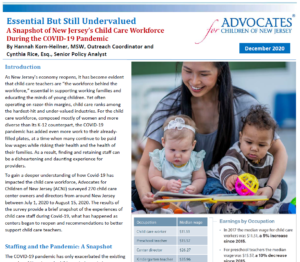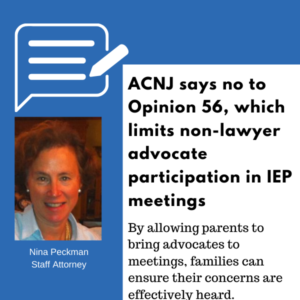CHILD CARE PROVIDERS AND PARENTS, LET YOUR VOICES BE HEARD!
The New Jersey Department of Human Services (DHS) has scheduled an opportunity for individuals and groups to provide oral and written testimony to inform DHS’ budgetary process for 2021-22. Particularly at this difficult time, it is critical that DHS hear from those most affected by the Department’s budgetary policies.
The Listening Sessions are scheduled for:
- Monday, December 14th between 3 PM and 5 PM
- Tuesday, December 15th, between 10 AM and 12 PM
There are two ways to have your voice head:
- Testify virtually: Individuals who would like to testify virtually must sign up for a time slot by first emailing humanservices@dhs.nj.gov. You must include your full name, phone number and organization, if applicable. You should prepare to testify for NO MORE THAN 3 MINUTES!
- Provide written testimony: Written testimony should be emailed no later than December 14th to humanservices@dhs.nj.gov.
DHS needs to hear you personal experiences, stories and recommendations.
Your voice is important and will help inform their decision making as they plan future funding. See sample bullet points below that may be included in your testimony to complement your individual experiences and stories:
For Child Care Providers
- Because of the impact that COVID-19 continues to have on the child care system and individual programs serving low income working families receiving subsidies, DHS budgetary policies must continue to reflect the realities of this struggling system and not return to funding policies, such as subsidy based on attendance that often makes state funding an unreliable funding source.
- The January 1st DHS plan to return to child care subsidy payments based on attendance is made worse with the reliance on parents to make daily calls to confirm their child’s attendance. The implementation of e-childcare required significant staff training and support for families. Under the current Department of Children and Families emergency standards, families cannot enter child care facilities, which minimizes contact between staff and families. At a time when families are experiencing their own difficulties, this additional burden is unnecessary and potentially places the funding of individual programs in jeopardy.
- Finding qualified staff was difficult prior to the pandemic. Since the pandemic, finding and keeping staff has become a bigger struggle, as salaries at or near minimum wage have made other employment options at the same or higher salary, far more appealing to existing or potential employees.
- The lack of health care coverage for many staff members only adds to finding and keeping staff. DHS needs to develop policies that will help provide additional funding directly to staff members to incentivize them to begin or continue to be child care professionals.
For Parents:
- Families who have returned or are returning to work need to know that their child care choices can be relied upon to care for and educate their children. Subsidy policies, need to stabilize the funding of this industry so that parents can be assured that the future of their child care’s existence is secure. Moreover, those policies, especially during this difficult time, should strive to reduce the burden on parents to produce a list of verification documentation, as well as the resulting back and forth with local agencies that delay the approval process and payments to providers.
- Parents need increased child care options and DHS funding policies should reflect that need. Such policies should include ways to stabilize existing programs and expand child care options including family child care.
- Most families continue to struggle with the cost of high quality child care. DHS funding for quality child care should recognize this struggle and view increased funding as a down-payment for children’s futures.
- The new DHS policy scheduled for January 1st requiring parents to call-in their child’s daily child care attendance is an additional burden on families, many of whom are already struggling during this pandemic.
Please do not let this opportunity slip away! Providing oral and/or written testimony to DHS ensures that your voice will be heard and your professional expertise and understanding of the issues will be considered in their planning for future funding. If you have any questions, please contact Cynthia Rice at crice@acnj.org.


 As New Jersey’s economy reopens, it has become evident that child care teachers are “the workforce behind the workforce,” essential in supporting working families and educating the minds of young children. To gain a deeper understanding of how Covid-19 has impacted the child care workforce, Advocates for Children of New Jersey (ACNJ) surveyed 270 child care center owners and directors from around New Jersey between July 1, 2020 to August 15, 2020. The results of the survey provide a brief snapshot of the experiences of child care staff during Covid-19, what has happened as centers began to reopen and recommendations to better support child care teachers.
As New Jersey’s economy reopens, it has become evident that child care teachers are “the workforce behind the workforce,” essential in supporting working families and educating the minds of young children. To gain a deeper understanding of how Covid-19 has impacted the child care workforce, Advocates for Children of New Jersey (ACNJ) surveyed 270 child care center owners and directors from around New Jersey between July 1, 2020 to August 15, 2020. The results of the survey provide a brief snapshot of the experiences of child care staff during Covid-19, what has happened as centers began to reopen and recommendations to better support child care teachers. On November 16, 2020, staff attorney Nina Peckman, on behalf of ACNJ, submitted comments to the Committee on the Unauthorized Practice of Law, urging them to remove language in Opinion 56, which states that only lawyers are to be allowed in Independent Education Program (IEP) and mediation meetings. By barring non-lawyer advocates from meetings, Peckman argues, parents, particularly low-income individuals, will be left to either hire a lawyer, or advocate for their own rights when they may not understand all the issues at hand. Additionally, non-lawyer advocates may have unique insight into the student’s particular needs, such as CASA volunteers helping foster children or CP&P social workers assisting their clients. By limiting their input, it is essentially harming the child.
On November 16, 2020, staff attorney Nina Peckman, on behalf of ACNJ, submitted comments to the Committee on the Unauthorized Practice of Law, urging them to remove language in Opinion 56, which states that only lawyers are to be allowed in Independent Education Program (IEP) and mediation meetings. By barring non-lawyer advocates from meetings, Peckman argues, parents, particularly low-income individuals, will be left to either hire a lawyer, or advocate for their own rights when they may not understand all the issues at hand. Additionally, non-lawyer advocates may have unique insight into the student’s particular needs, such as CASA volunteers helping foster children or CP&P social workers assisting their clients. By limiting their input, it is essentially harming the child.